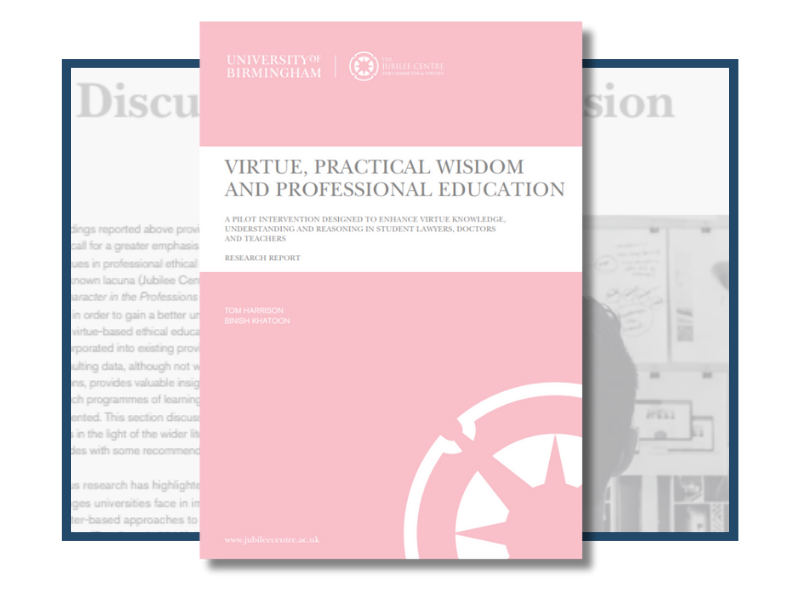Project Overview
The Virtue, Practical Wisdom and Professional Education research report was published on 8th December 2017.
The report describes the methods employed in developing, implementing, and piloting a new online intervention, entitled Character in the Professions, which was designed to introduce the concepts of character, virtue, and practical wisdom (phronesis) to student lawyers, doctors, and teachers, to encourage them to develop a better understanding of what it means to ‘serve’ others in the course of their professional lives.
The primary aim of the research was to consider how professional education interventions on character might be implemented. The research also sought to explore the likely impact of the interventions on participants’ understanding of character and their ability to reflect upon the appropriate application of the virtues.
Summary of Key Findings
- Participation in the interventions resulted in students developing their Virtue Knowledge and Understanding and became more familiar with the theory of virtue ethics;
- Medical students developed their Virtue Reasoning during the intervention and were more likely to give character-based, as opposed to rules- and/or consequence based, reasons for responding in a certain way to an ethical dilemma;
- Participating students and tutors found the intervention to be of high quality and of relevant content that complemented existing programmes of study.

Project Summary
Project Overview
The Interventions in Trainee and Student Teachers, Lawyers and Doctors project has developed and piloted interventions that prioritise the integration of virtue-based practice into teaching, law and medical professions. The research seeks to enable medical, law and teaching students in Higher Education to understand what it means to be a virtuous professional in their area of expertise.

Some 500 law, medical and teaching students have participated in a module integrated into subject courses geared to provide a better understanding and appreciation of virtue in professional life.
It is intended that those experiencing the course will develop an understanding of what it means to be a virtuous professional, which in turn will lead to them developing a better understanding of what it means to ‘serve’ others in the course of their professional lives.
Read our Virtue Insight blog ‘Virtue Training‘ introducing the project.
Literature Review & Findings
It is evident that there has been a change in educational emphasis from character to technical competency. In recent years, popular culture has been packed with unfortunate and highly exposed manifestations of the misadventures and harm caused by professionals not acting virtuously, or not displaying practical wisdom.
A comprehensive literature review has found that there is no course that encourages students of the professions to think about the role of phronesis in their areas of expertise.
An increasingly popular medium for delivering and assisting teaching material today is the internet; the intervention developed for this project has been piloted as an online course.
Feedback from experts has shown that the emergence of a ‘hidden curriculum’ (a focus on developing practical wisdom) needs to be considered and its content drawn out explicitly by helping professionals to discuss character development openly with colleagues and give clearer feedback to students.
Project Milestones
The has developed and piloted an online intervention, which has been differentiated for the training of legal, medical, and teaching professionals. Universities participating in the pilot were encouraged to include the intervention within their teaching syllabus at undergraduate level. The NHS and regulators for medical and legal professionals have been consulted with during the development process.
Partners
- Health Education West Midlands
- University of East Anglia
- Queen Mary, University of London
- Dental School, Birmingham
- University of Huddersfield
- University of Leicester
- Nottingham Trent University
- University of Warwick
- University of Law
- University of Edinburgh
- University of Birmingham
- University of Kent
- University of St Mark and St John
- Manchester Metropolitan University
